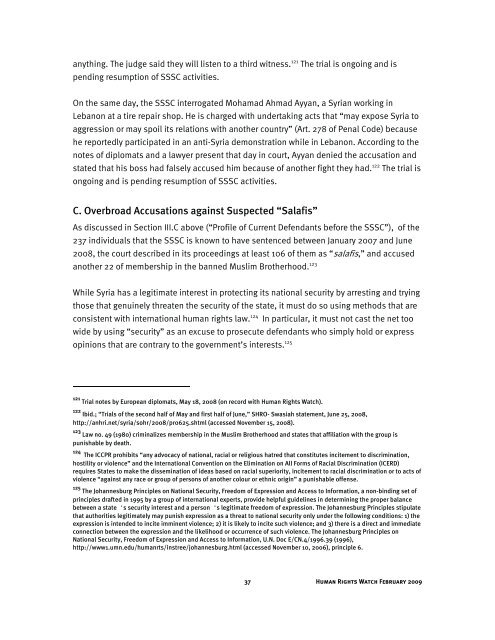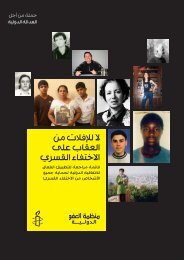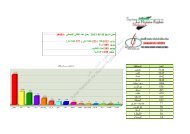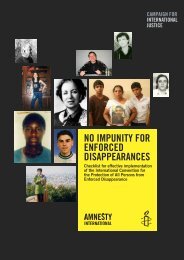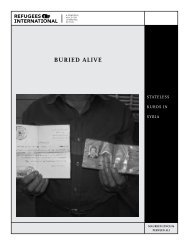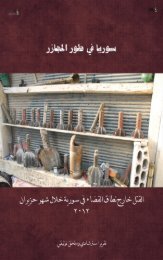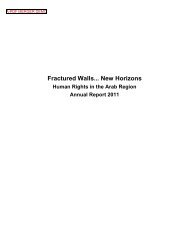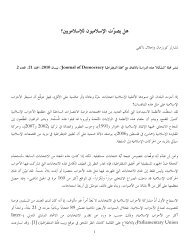Far From Justice - Human Rights Watch
Far From Justice - Human Rights Watch
Far From Justice - Human Rights Watch
- No tags were found...
You also want an ePaper? Increase the reach of your titles
YUMPU automatically turns print PDFs into web optimized ePapers that Google loves.
anything. The judge said they will listen to a third witness. 121 The trial is ongoing and ispending resumption of SSSC activities.On the same day, the SSSC interrogated Mohamad Ahmad Ayyan, a Syrian working inLebanon at a tire repair shop. He is charged with undertaking acts that “may expose Syria toaggression or may spoil its relations with another country” (Art. 278 of Penal Code) becausehe reportedly participated in an anti-Syria demonstration while in Lebanon. According to thenotes of diplomats and a lawyer present that day in court, Ayyan denied the accusation andstated that his boss had falsely accused him because of another fight they had. 122 The trial isongoing and is pending resumption of SSSC activities.C. Overbroad Accusations against Suspected “Salafis”As discussed in Section III.C above (“Profile of Current Defendants before the SSSC”), of the237 individuals that the SSSC is known to have sentenced between January 2007 and June2008, the court described in its proceedings at least 106 of them as “salafis,” and accusedanother 22 of membership in the banned Muslim Brotherhood. 123While Syria has a legitimate interest in protecting its national security by arresting and tryingthose that genuinely threaten the security of the state, it must do so using methods that areconsistent with international human rights law. 124 In particular, it must not cast the net toowide by using “security” as an excuse to prosecute defendants who simply hold or expressopinions that are contrary to the government’s interests. 125121 Trial notes by European diplomats, May 18, 2008 (on record with <strong>Human</strong> <strong>Rights</strong> <strong>Watch</strong>).122 Ibid.; “Trials of the second half of May and first half of June,” SHRO- Swasiah statement, June 25, 2008,http://anhri.net/syria/sohr/2008/pr0625.shtml (accessed November 15, 2008).123 Law no. 49 (1980) criminalizes membership in the Muslim Brotherhood and states that affiliation with the group ispunishable by death.124 The ICCPR prohibits “any advocacy of national, racial or religious hatred that constitutes incitement to discrimination,hostility or violence” and the International Convention on the Elimination on All Forms of Racial Discrimination (ICERD)requires States to make the dissemination of ideas based on racial superiority, incitement to racial discrimination or to acts ofviolence “against any race or group of persons of another colour or ethnic origin” a punishable offense.125 The Johannesburg Principles on National Security, Freedom of Expression and Access to Information, a non-binding set ofprinciples drafted in 1995 by a group of international experts, provide helpful guidelines in determining the proper balancebetween a state‘s security interest and a person‘s legitimate freedom of expression. The Johannesburg Principles stipulatethat authorities legitimately may punish expression as a threat to national security only under the following conditions: 1) theexpression is intended to incite imminent violence; 2) it is likely to incite such violence; and 3) there is a direct and immediateconnection between the expression and the likelihood or occurrence of such violence. The Johannesburg Principles onNational Security, Freedom of Expression and Access to Information, U.N. Doc E/CN.4/1996.39 (1996),http://www1.umn.edu/humanrts/instree/johannesburg.html (accessed November 10, 2006), principle 6.37 <strong>Human</strong> <strong>Rights</strong> <strong>Watch</strong> February 2009


